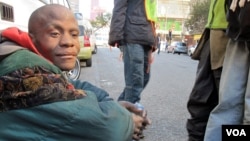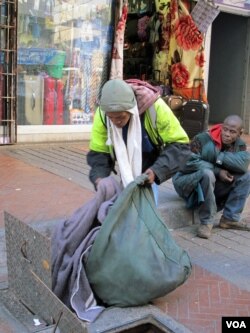JOHANNESBURG —
While there has been substantial research into homelessness in South Africa, the issue of homeless persons with mental illness has received scant attention from researchers, services providers, policy makers and local authorities. Very little is known about this group of people living on the fringes of society.
Snow-capped hills and sub-zero temperatures signal that winter has arrived in South Africa. For the homeless in Hillbrow, an inner city residential neighborhood in Johannesburg, survival in the harsh winter temperatures is tough.
Life on the street
Sibusiso Fuluni is homeless and said he has been living on the streets for many years. “Lots of people die on the streets…even the winter. When it is closed, there the shop, we just make the blanket to sleep there by the Shoprite. Our blanket we put under drain…I can show you our blanket….”
In the middle of a bustling street in Hillbrow, Fuluni lifts a heavy metal drain cover to reveal a grubby pile of blankets and clothes wrapped in a tight ball.
There is a vast amount of research about South Africa’s homeless but very little is known about homeless people suffering from mental illness.
Homeless and mentally ill
New research by Unotida Moyo from the University of Johannesburg, in conjunction with the Center for Social Development in Africa sheds some light on the group of people living on Johannesburg’s streets.
Moyo was motivated to pursue research into homelessness and mental health when her mentally ill brother went missing and nearly ended up on the streets.
“So, I discovered there is a need for families and departments, different departments to really assist these people, so that they don’t land on the street without any help because you can see even their health is compromised," she explained. "They die on the streets, it is cold, they die on the streets from HIV related diseases, tuberculosis, it’s a lot.”
Vulnerabilities
Moyo said that mental illness can increase the risk of homelessness, while the harsh conditions on the streets are likely to produce and aggravate symptoms of mental health. The nature of mental illness, she said, makes it difficult for homeless people to negotiate street life and meet their needs for food, safety, shelter and treatment.
The homeless are particularly vulnerable to violence in Johannesburg. Police brutality is a common complaint on the streets of Hillbrow and became particularly problematic when South Africa hosted the World Cup in 2010.
“Yeah, take my blanket, beat us with a stick, spray us with a spray gun, chase us away. They don’t want us on the street,” Fuluni said.
Vukile Ntandane, the station commander of Hillbrow Police Station disputes the accusations but said that the city’s police alone cannot help the homeless and that inter-agency collaboration is needed. “I am not denying that it is happening, it may be happening I don’t know," he stated. "But we must work together to avoid such things.”
Human rights often violated
Progressive social policies and legislation such as the Bill of Rights of the Constitution of the Republic of South Africa, and the Mental Health Care Act of 2002, do have provisions for people with mental health issues.
However, Moyo found that the rights of many homeless people with mental illness are violated, because services for them often lag behind policy and legislation. During her interviews, homeless people complained of hostility from some health professionals and of having to wait longer than other patients at clinics and hospitals. But resources are stretched - a local nurse complained that the psychiatric ward was short-staffed and not able to cope with the demand.
Professor Eleanor Ross at the university oversaw the research and backs up this complaint. “Homelessness would also appear to be increasing without a concomitant increase in health and welfare personnel to cater for their needs,” she explained.
More research, better solutions needed
She argued that there is a need for further research to evaluate the effectiveness of services for the homeless and homeless mentally ill people in Hillbrow. Patients who are homeless and mentally ill and need regular treatment often do not return for follow-up treatment. Habitual drug users are reluctant to go into shelters because of the strict rules they have to adhere to, and when treatment for drug addiction is given, they often relapse.
“The results would appear to reflect the failure of housing, welfare, education and healthcare policies, and need to be viewed against the backdrop of poverty, unemployment and violence in South Africa,” she noted.
Despite the adverse living conditions, the research note revealed that the homeless and homeless mentally ill groups relate well to each other, but the latter tend to depend heavily on others for support. Sello is 23 years old and has been living on the streets for a decade. He looks after his friend who is mentally ill and homeless.
Sello said that they take care of each other and if they see that someone amongst them is mentally ill, they will help that person get food, ensure that they have a bath if there is an opportunity and look out for them on the street. For Sello, he said it is not difficult, they are used to helping each other where they can.
The research paper recommends that better strategies be drawn up and more research carried out to give a better understanding of this group on the fringes of society. Crucially, the factors driving people onto the streets, including those with mental illness, need to be addressed.
Snow-capped hills and sub-zero temperatures signal that winter has arrived in South Africa. For the homeless in Hillbrow, an inner city residential neighborhood in Johannesburg, survival in the harsh winter temperatures is tough.
Life on the street
Sibusiso Fuluni is homeless and said he has been living on the streets for many years. “Lots of people die on the streets…even the winter. When it is closed, there the shop, we just make the blanket to sleep there by the Shoprite. Our blanket we put under drain…I can show you our blanket….”
In the middle of a bustling street in Hillbrow, Fuluni lifts a heavy metal drain cover to reveal a grubby pile of blankets and clothes wrapped in a tight ball.
There is a vast amount of research about South Africa’s homeless but very little is known about homeless people suffering from mental illness.
Homeless and mentally ill
New research by Unotida Moyo from the University of Johannesburg, in conjunction with the Center for Social Development in Africa sheds some light on the group of people living on Johannesburg’s streets.
Moyo was motivated to pursue research into homelessness and mental health when her mentally ill brother went missing and nearly ended up on the streets.
“So, I discovered there is a need for families and departments, different departments to really assist these people, so that they don’t land on the street without any help because you can see even their health is compromised," she explained. "They die on the streets, it is cold, they die on the streets from HIV related diseases, tuberculosis, it’s a lot.”
Vulnerabilities
Moyo said that mental illness can increase the risk of homelessness, while the harsh conditions on the streets are likely to produce and aggravate symptoms of mental health. The nature of mental illness, she said, makes it difficult for homeless people to negotiate street life and meet their needs for food, safety, shelter and treatment.
The homeless are particularly vulnerable to violence in Johannesburg. Police brutality is a common complaint on the streets of Hillbrow and became particularly problematic when South Africa hosted the World Cup in 2010.
“Yeah, take my blanket, beat us with a stick, spray us with a spray gun, chase us away. They don’t want us on the street,” Fuluni said.
Vukile Ntandane, the station commander of Hillbrow Police Station disputes the accusations but said that the city’s police alone cannot help the homeless and that inter-agency collaboration is needed. “I am not denying that it is happening, it may be happening I don’t know," he stated. "But we must work together to avoid such things.”
Human rights often violated
Progressive social policies and legislation such as the Bill of Rights of the Constitution of the Republic of South Africa, and the Mental Health Care Act of 2002, do have provisions for people with mental health issues.
However, Moyo found that the rights of many homeless people with mental illness are violated, because services for them often lag behind policy and legislation. During her interviews, homeless people complained of hostility from some health professionals and of having to wait longer than other patients at clinics and hospitals. But resources are stretched - a local nurse complained that the psychiatric ward was short-staffed and not able to cope with the demand.
Professor Eleanor Ross at the university oversaw the research and backs up this complaint. “Homelessness would also appear to be increasing without a concomitant increase in health and welfare personnel to cater for their needs,” she explained.
More research, better solutions needed
She argued that there is a need for further research to evaluate the effectiveness of services for the homeless and homeless mentally ill people in Hillbrow. Patients who are homeless and mentally ill and need regular treatment often do not return for follow-up treatment. Habitual drug users are reluctant to go into shelters because of the strict rules they have to adhere to, and when treatment for drug addiction is given, they often relapse.
“The results would appear to reflect the failure of housing, welfare, education and healthcare policies, and need to be viewed against the backdrop of poverty, unemployment and violence in South Africa,” she noted.
Despite the adverse living conditions, the research note revealed that the homeless and homeless mentally ill groups relate well to each other, but the latter tend to depend heavily on others for support. Sello is 23 years old and has been living on the streets for a decade. He looks after his friend who is mentally ill and homeless.
Sello said that they take care of each other and if they see that someone amongst them is mentally ill, they will help that person get food, ensure that they have a bath if there is an opportunity and look out for them on the street. For Sello, he said it is not difficult, they are used to helping each other where they can.
The research paper recommends that better strategies be drawn up and more research carried out to give a better understanding of this group on the fringes of society. Crucially, the factors driving people onto the streets, including those with mental illness, need to be addressed.





